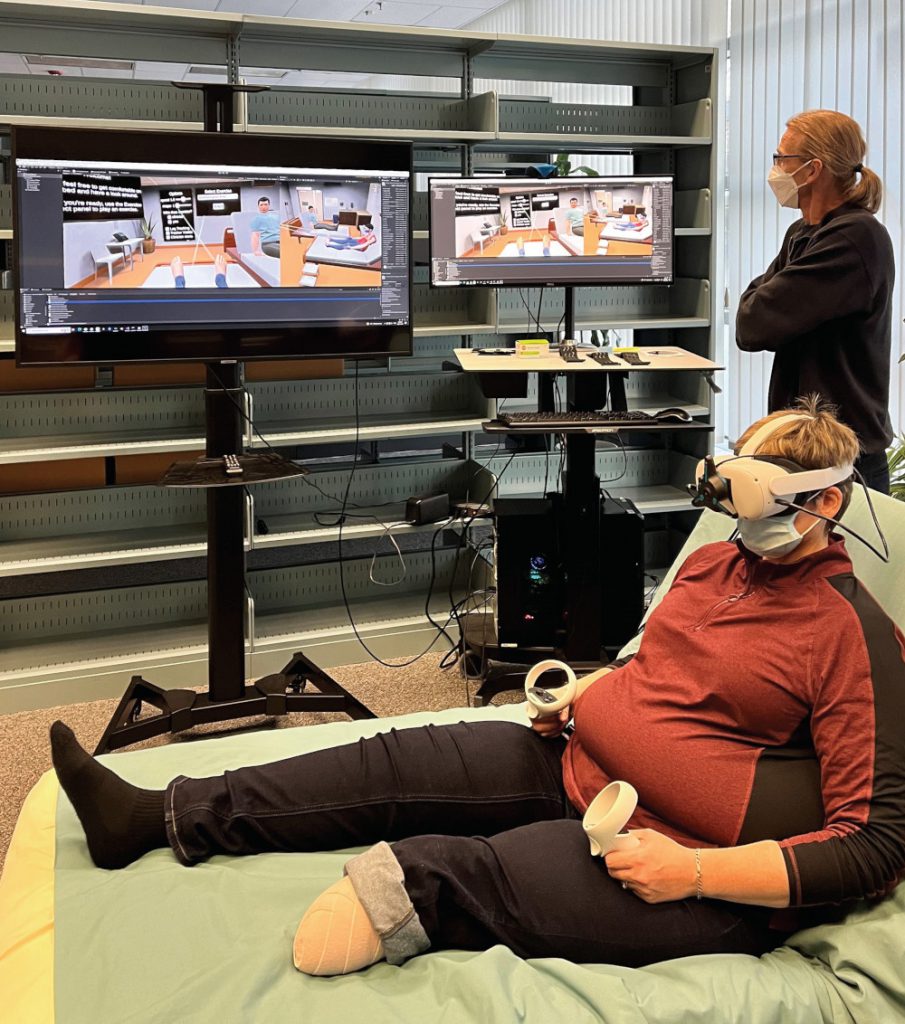Leading-edge studies focused on phantom limb pain, Huntington’s disease and heart valve disease each received funding of $100,000 from The Winnipeg Foundation Innovation Fund in 2023.
The one-year grants are part of The Winnipeg Foundation’s $1-million commitment to supporting innovative medical research undertaken by interdisciplinary teams at UM.

Testing virtual-reality therapy for phantom limbs
A team led by Renée El-Gabalawy [B.Sc./08, MA/10, PhD/15], associate professor of clinical health psychology and anesthesiology, perioperative and pain medicine, will use virtual reality (VR) to retrain patients’ brains as a way of treating phantom limb pain.
Patients who have phantom limb pain experience sensations like stabbing, burning or throbbing in a limb that isn’t really there because it has been amputated.
The team will conduct a clinical trial to evaluate the first-of-its-kind VR treatment. The patient will wear a VR headset for virtual therapy. One aspect of the experience will be “adapted mirror box therapy,” in which the patient will see their missing limb as if it is still intact.
The patient will perform a series of exercises while sensors are attached to the stump of the missing limb. This will help to reduce pain signals from the brain, El-Gabalawy said.
“If it’s found to be effective, I envision a future where this VR treatment will not only be accessible to patients in the hospital, but also at home,” she said.
Advancing knowledge of Huntington’s disease
Dr. Galen Wright, Canada Research Chair in neurogenomics and assistant professor of pharmacology/therapeutics and biochemistry/medical genetics, leads a study of the genetic modifiers in Huntington’s disease, an inherited condition that causes the breakdown of nerve cells in the brain.
“Even though we have known the genetic cause of Huntington’s disease for more than 30 years, no effective treatments exist,” Wright said. “Many of the technologies we’re using only became available in recent years.”
In animal models, the team will use innovative techniques to monitor the progression of individual brain cells. They will also employ advanced genomic techniques to look at gene expression changes in cell types.
The team’s findings could be useful in developing drugs to treat Huntington’s disease, as well as other diseases caused by genetic mutations, Wright said.
Using multi-omics and artificial intelligence to study heart disease
A study led by Dr. René Zahedi, professor of internal medicine and biochemistry/medical genetics, will use multi-omic analyses and artificial intelligence (AI) to better understand calcified aortic valve stenosis.
The disease occurs when calcium buildup narrows the aortic valve opening in the heart, preventing normal blood flow. “This disease has a very complex molecular mechanism, so we want to look at it from different perspectives,” Zahedi said.
The researchers will apply expertise in proteins and lipids to examine what goes wrong in the heart valve at the molecular level. They also aim to identify markers in patients’ blood that could allow doctors to detect the early stages of the disease, or warning signs of it.
The cutting-edge aspect of this research is using AI to analyze the data, Zahedi said.
To read more about the projects and teams, visit UM Today.
BY MATTHEW KRUCHAK
